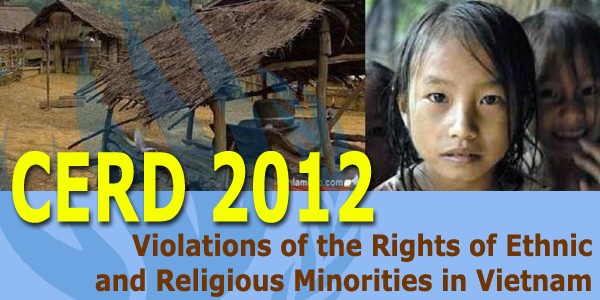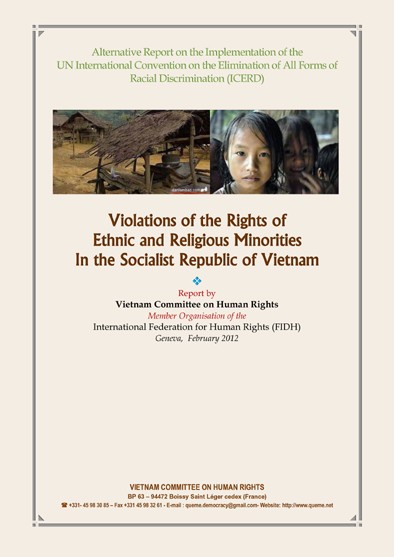
PARIS-GENEVA, 15 March 2012 (VCHR & FIDH) – The International Federation for Human Rights (FIDH) and the Vietnam Committee on Human Rights welcome the conclusions issued by the UN Committee on the Elimination of Racial Discrimination (CERD) after examining Vietnam’s periodic report on its implementation of the International Convention on the Elimination of All Forms of Racial Discrimination on 21-22 February 2012. The conclusions and recommendations by the CERD chided Vietnam for its “considerably overdue” report, in which Vietnam claimed that there was no racial discrimination, and provided no concrete facts on cases of abuse. The Vietnam Committee on Human Rights had submitted an alternative report to the CERD detailing extensive cases of discrimination which were widely taken up by the UN experts.
The CERD countered Vietnam’s denials of the facts by evoking numerous reports of forced displacement of ethnic minorities (such as the Degars, Hmongs and Khmer Krom), “confiscation of ancestral lands without prior consent and appropriate compensation”, “double discrimination” (discrimination on racial and religious grounds), and forced repatriation of members of indigenous minorities seeking refuge abroad. Moreover, observing glaring disparities in the distribution of economic growth, the UN experts said they were “deeply concerned at the sizeable socio-economic gap between disadvantaged ethnic minorities and the majority Kinh, even when they live in the same mountainous area”.
The CERD expressed particular concern about “persistent reports of arrests, arbitrary detention and ill-treatment in custody of religious minority groups due to their peaceful practice of religion and freedom of expression”, the “lack of effective investigation of those allegations and the lack of effective remedies provided for the victims”. They called for an end to these abuses of freedom of expression, peaceful assembly and association, and freedom of religion or belief, and urged Vietnam to release all “those in detention for activities that would, under international standards, constitute the peaceful exercise of the aforementioned rights”.
The FIDH and the Vietnam Committee on Human Rights regret that Vietnam’s very first gesture, following the publication of the CERD’s conclusions, was to condemn eight ethnic Hmongs on 13 March 2012 to prison sentences of two years to 30 months (followed by two years probationary detention) following demonstrations in the northern province of Dien Bien in April-May 2011. The Vietnamese authorities deployed special force units and armed helicopters to crush these peaceful protests of several thousands of Hmongs.
In their conclusions, the CERD noted that racial discrimination and inequality in Vietnam was not only due to lack of preventive action by the government, but also to the perpetuation of “negative societal attitudes and stereotypes against ethnic minorities”, as well as a whole arsenal of anti-human rights regulations and legislation, and the lack of an independent judiciary.
“Vietnam is as consistent in abusing the rights of its citizens as it is inconsistent in making sure its laws and practices comply with all the international human rights instruments that it ratified”, said Souhayr Belhassen, FIDH President.
The UN experts expressed particular concern about Vietnam’s “broad and imprecise wording of certain provisions” in the Criminal Code, such as article 87 on “undermining the unity policy”, and the “possible misuse of those provisions against some ethnic minorities”, or Article 91 of the Criminal Code, which criminalizes fleeing abroad to escape persecution, which they said was “incompatible with article 68 of the Vietnamese Constitution”.
Concerned by widespread violations of religious freedom, the CERD denounced several provisions in Vietnam’s 2004 “Ordinance Regarding Religious Beliefs and Religious Activities “which appeared to be discriminatory on both ethnic and religious grounds” and “forbid religious activities deemed to “violate national security””, as well as Decree 22 (on the implementation of the Ordinance) which imposes strict controls on religions. They noted “numerous and consistent reports about discrimination and restriction on religious practices by some Christian and Buddhist denominations” through “legislation, registration requirements, surveillance and imprisonment”.
Other restrictive laws singled out by the CERD include Decree 38/2005/ND-CP on Public Order which bans demonstrations outside public buildings, Circular 09/2005/TT-BCA which bans gatherings of more than five people without a permit, and Ordinance 44 which empowers local Police and officials to detain persons for up to two years without any process of law. They called on Vietnam to revise these laws.
The CERD also called on Vietnam to revise the system of household registration or hộ khẩu which “results in discrimination against ethnic minorities belonging to ‘unrecognised’ religious groups, in the fields of employment, social security, health services, education and the right to freedom of movement”. The Hộ khẩu, which contains details of the ethnic origins, religion, and previous political affiliations of all family members, is an essential requirement for travel, employment, marriage, births and gaining access to government services, and is used as a tool to control the Vietnamese population.
“In diplomatic but very strong terms, the CERD has asked Vietnam to do what all Vietnamese wish for deep inside – to dismantle the totalitarian and arbitrary state. The racial discrimination suffered by Vietnam’s ethnic minorities is extremely serious, and cannot end unless the mechanisms of state repression have been removed”, said Vo Van Ai, President of the Vietnam Committee on Human Rights. “The CERD urged Vietnam to make their conclusions public and circulate them widely in Vietnam. It is doubtful that Vietnam, which takes its own denials for reality, will comply. We therefore rely on the international community, including the media, civil society and democratic governments to bring this information to the people of Vietnam”.
Related stories :
– UN to review Vietnam’s efforts to eliminate racial discrimination (VCHR, 20 February 2012)
– Vietnam religious minorities face persecution says activist (AFP, 20 February 2012)
– At the 80th Session of the UN Committee on the Elimination of Racial Discrimination: UN Committee calls on Vietnam to cease persecution of religious and ethnic minorities (VCHR, 24 February 2012)
This post is also available in:
 Quê Me Quê Me: Action for democracy in Vietnam & Vietnam Committee on Human Rights
Quê Me Quê Me: Action for democracy in Vietnam & Vietnam Committee on Human Rights




